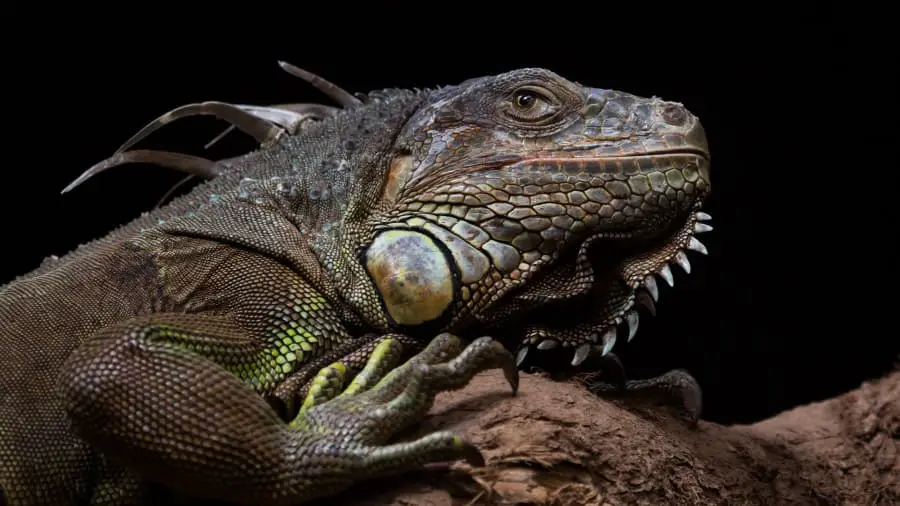
The most common iguanas are green in color but why do they turn black sometimes? I was wondering the same thing when I saw my little iguana turning black all of a sudden. So, I went on the internet, did a bunch of research for the answer, and here is what I found.
Iguanas turn black when they feel cold, stress, or both at the same time. Either way, it is not a good sign for iguanas, proper actions need to be taken as soon as possible.
When iguanas are green in color, it can be quite obvious when they turn black. However, there are some iguanas that have a natural brown or tan color to them. It will be much harder to spot them turning black.
In this article, I will breakdown the reasons why iguanas turn black and how it should be treated.
Things That Stress Iguanas Out
There are many situations or reasons that can cause iguanas to be stress. They usually come down to improper care. Here are the 5 most common situations that cause iguanas to stress out.
1. Inappropriate Living Conditions
Cage Too Small – Iguanas love big enclosure, small spaces will give them a lot of stress. Let me give you an idea of how big the enclosure should be.
| Dimension | Measurement (Minimum) |
|---|---|
| Length | 2x iguana SVL |
| Width | 1x iguana SVL |
| Height | 1.5x iguana SVL |
Iguana length should be measured from snout to vent (SVL). This means measuring the length from the head to the end of the body, right before the start of the tail.
When your iguana is small and still a baby, it is okay to put it in a small cage. This will allow your baby iguana to easily navigate around. However, as it grows, you should upgrade and move it to a bigger enclosure.
Bad Living Conditions – Other than size, you also need to make sure that your iguana gets what it needs. These things include proper lighting, temperature, basking spots, good food, and so on.
When iguanas are unable to do its thing properly, such as basking at the right temperature, it will be very unhappy. This will lead to stress.
2. Lack of Routine
This might surprise you but iguanas are very disciplined animals and they love having a routine to follow. They want to eat, sleep, and go to the toilet at about the same time every day.
It is very important that you follow a strict routine for your iguana. Any changes to the routine will make any iguana stress out.
To make your life easier, automate as much as possible. One thing you can do is to get a timer for all the lights to switch off at a certain time of the day.
I highly recommend getting these timers. Click here to get them on Amazon (#ad). This thing will save you a lot of time and headaches.
3. Another Iguana Around (Competition)
Iguanas can live alone without any issues. If there is another iguana around its enclosure or around the house, it will feel stressed. They see other iguanas as competition for territory, especially if they are both males.
4. Change of Environment
Changing an iguana’s environment is one of those things you should avoid unless there is no choice. They absolutely hate new environments.
That’s why it is recommended to give the iguana at least 2 weeks to settle into his or her new place before interacting with it. Even simple things such as changing your clothes or looks will stress iguanas out.
They are extremely sensitive to changes around them. In fact, they prefer having the same old routine day after day. But as time pass, iguanas will learn to get used to its new environment and relax.
5. New Faces
Anti-social people and iguanas are quite similar. They hate meeting new people… at least at first. This is more prominent in young, untamed iguanas.
How to Spot A Stressed Iguana?
It might take a while before an iguana turns black from stress. Hence, it is important to learn how to spot a stressed iguana before that happens.
This will allow you to take action quickly and release your iguana’s stress before it gets worse. Here are some signs to look out for…
- Hiding
- Less appetite than usual
- Soak in water for a prolonged period
- Irregular defecation
- Change in tameness
Other than stress, these signs could also be an indication of illness in an iguana.
Will Stress Kill My Iguana?
The short answer is yes. However, it is only with severe stress that has been going on for a prolonged amount of time.
Iguanas with severe stress might stop drinking and eating properly, which leads to dehydration and rapid weight loss.
Moreover, severe stress in iguanas can cause their immune system to be suppressed. All these combined together will lead to the death of the iguana.
Therefore, it is extremely important to spot when your iguana is stress as soon as possible. Find out the reason for it and fix it right away.
Heat Absorption
Sometimes, iguanas could also turn black because they are cold. Turning black will help iguanas absorb more heat, either from the sun or light in the cage.
If you find your iguana turning black in its cage, check the temperature. If the iguana is under the basking spot and it still turns black, you have to crank the heat up.
Here is an example of how it looks when iguanas turn black. In this video, you will see an iguana turning black to absorb more heat from the sun:
Ideal Temperature for Iguanas
There are two temperatures you have to pay attention to. The temperature for the basking spot and temperature for the non-basking spot. The non-basking spot should be around 75°F to 80°F and 95°F to 100°F for the basking spot.
Ensure The Ideal Temperature
To make sure the iguana’s enclosure is always at its ideal temperature, you’ll need a digital thermometer. These will make the temperature within the cage easy to read so you can adjust accordingly. You will never have to guess again.
Conclusion
The reasons to why iguanas turn black could either be they are cold or feel stressed. There are many things that can make iguanas stress, make sure to be aware of them.
Furthermore, there are signs other than turning black that could indicate an iguana is stressed. Spotting it early is important because severe, prolonged stress can kill an iguana.
However, when an iguana turns black, it could also mean it is cold. By turning black, they are able to absorb more heat.


